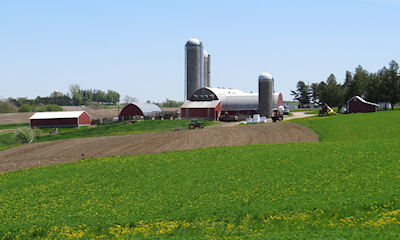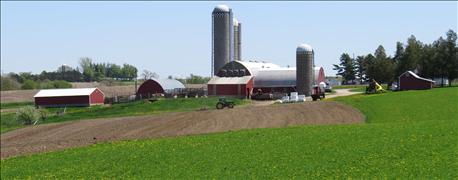
Mike Milligan, a farmer from Cass City, Michigan, says it’s only a matter of time before all aspects of farm management must be recorded, which is why he is involved in one of Syngenta’s sustainability initiatives that is partnering with blue-chip brands.
He’s part of a program that seeks to provide a one-stop shop capturing an immense amount of data to help growers make the most yield-boosting and environmentally conscious decisions on the farm.
The project uses the AgriEdge Excelsior program, which combines total-farm management with record-keeping software and personalized, on-farm support.

Program collects immense data with eye on sustainability
“Sustainability and accountability are the way the world is going, and I want to be ready,” says Milligan, who farms 4,000 acres of corn, soybeans, wheat, and black and navy beans with his father, Dave.
AgriEdge Excelsior has over 14 million acres enrolled in the program across the United States and all growers participating in it have access using the software for sustainability measurement on their row crop production. A subset of growers choose to participate in Sustainable Solutions. Syngenta’s Sustainable Solutions team is working with growers across several commodity and specialty crops.
The program uses Land.db software for data and record-keeping access. Developed by Ag Connections, the software captures all information associated with a farm, including yield, timing of sprays, compliance reporting, as well as input costs and return on investment, then tracks, measures and examines each acre.
That information, according to Erin Koglin, is what processors, retailers, stakeholders and consumers are becoming more and more interested in. Koglin is the AgriEdge Specialist in Michigan based out of Lansing.
“We have a project in the Thumb that is tied to white wheat where we are developing a Field to Market field print.”
In addition to tillage practices, spray records and cover crops, the software also includes other less tangibles such as, land use, greenhouse gas emissions and the carbon foot print. “We can then compare that to publically available data. We can also aggregate that data upon grower agreement to show what this market area is doing,” Koglin says. “The consumer does care, but doesn’t always know how wheat is turned into their cereal on the shelves.”
Kellogg is one company making strides to connect with the farm with a new program called Open for Breakfast. Kellogg is committed to responsibly sourcing 10 priority global ingredients and materials by 2020 – which means taking into account social and environmental considerations when sourcing these ingredients with suppliers. The priority ingredients include corn, wheat, rice, potatoes, sugar (beet and cane), cocoa, palm oil, fruits (berries, raisins/sultanas) and vanilla.
As part of these initiatives, growers are collecting 200+ farm data points per acre to analyze within the AgriEdge Excelsior program. This data helps the growers report the story of the environmentally-conscious decisions made on their farms.
Milligan, who graduated from college last year, calls it “his baby,” as it was his idea to get the farm involved with the AgriEdge Excelsior program after he came back to the farm. He started using the program in April and says, “It gives us a benchmark and an advantage as far as sustainability.”
He uses Land.db to track every pass across the field. “We especially use it on wheat and have been doing it for Star of the West.”
There’s no premium for that information, but for his participation in the sustainability project, there is no charge for the software. AgriEdge Excelsior is a commercial offer from Syngenta and is available to growers meeting specific requirements in their region.
Milligan says Koglin was out to the farm several times when they first got started. Part of the program is service – AgriEdge Specialists, such as Koglin, are available to help guide growers throughout the season. “I’m there to walk the fields with them and answer any questions,” she says.
“Sustainability is a buzz word that means something to everyone,” she adds. “We need to continue to improve, but that doesn’t necessarily mean stop using fertilizer, we just need to be more efficient with sound practices. With grower permission, we can generate aggregate data, along with individual farm reports, and make recommendations, like maybe adding a cover crop, or increasing efficiency in truck driving and making an upgrade that is better for the environment.”
Milligan particularly likes the software and ability to track. “I definitely like the spraying part of it, which contains all EPA and registration numbers. I can print out that information if I am ever questioned for work orders or tank mixes. It’s very user friendly. For our edible beans, I can easily create a report and declare what we sprayed in five minutes at the end of the season.”
Koglin says the goal is to provide fact-based information to consumers and end users to show how farmers are operating sustainably. However, achieving that objective is entirely at the hands of farmers, she says. “There is strict data privacy, as they own and control their data, which is unique to our model,” she explains.
Also part of the AgriEdge Excelsior program is a cost-share opportunity to mitigate some risks.
For more information on the AgriEdge Excelsior program, visit www.AgriEdge.com or contact your Syngenta retailer.
About the Author(s)
You May Also Like






